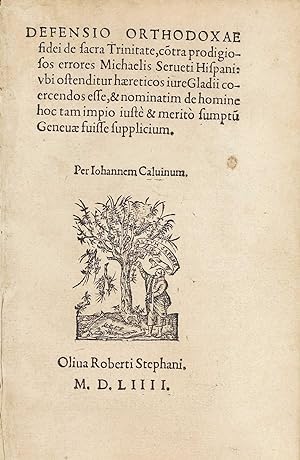Descripción
Defensio orthodoxae fidei de sacra Trinitate, co[n]tra prodigiosos errores Michaelis Serveti Hispani: ubi ostenditur haereticos iure gladii coercendos esse, . . [Geneva]: Robert Estienne, 1554. pp. 261 [1]. Signatures: (a-q)8 r4 [-r4], bound without blank leaf r4. Printer's woodcut device to title, floral woodcut initial, list of subscribers on r3v. [Bound with:] CALVIN, Jean. Defensio sanae et orthodoxae doctrinae de sacramentis, eorumque natura, vi, fine, usu, et fructu : quam pastores et ministri Tigurinae ecclesiae et Genevensis antehac brevi consensionis mutuae formula complexi sunt : una cum refutatione probrorum quibus eam indocti et clamosi homines infamant. [Geneva]: Robert Estienne, 1555. pp. 52. Signatures: (A-B)8 C10. Printer's woodcut device to title, floral woodcut initial, text ends on p.52 without colophon as called for. Two works in one volume. 8vo (177 x 117 mm). 17th century full vellum, spine with 5 raised bands, gilt-lettering in first two compartments (soiling of vellum, worming to upper spine). Text little browned only, first work with a few wormholes to upper blank corner of about 30 leaves and to gutter of first gathering repaired (not affecting text), title-leaf partially detached, old repair with paper stripe to upper blank inner margin of leaves r2-3, occasional minor spotting; second work with faint dampstain to upper margin of first gathering. Provenance: H.M. Bennett Esq., Clacton on Sea (letter from P.M. Barnard, bookseller, laid in, requesting more information about this copy). A fine copy in untouched binding. Text collated complete. ---- I. Gilmont, Bibliotheca calviniana, no. 54/6; Renouard, Estienne, p. 84. FIRST EDITION of one of the most important writings by Calvin and as such of the most frightening and startling that have been written to justify the persecution of heretics. Calvin published this work just a few months after the famous trial of Michael Servetus, deemed heretical for his denial of the (Nicaean) doctrine of the Trinity and condemned to death on October 26, 1553 by the Council of the Republic of Geneva, then burned alive the next day in Champel, at the gates of the city. Born about 1509-1511, this Spanish physician, author of pioneering work on the blood circulation, had attracted the wrath of the Catholic and Protestant authorities with two controversial books on Christian religion, the De trinitatis erroribus (1531), questioning the traditional dogma of Trinity, and the Christianismi restitutio (1553), in which he commented on the errors of the Church and its so-called reforms. After the execution of Servetus, Calvin, much criticized for his intolerance and the methods used in the anti-trinitarian judgment, tried in the Defensio orthodoxae fidei trinitate to justify his virtue in this affair. The work appeared at the beginning of the year 1554. Approved by the ministers and pastors of Geneva, a list of names is printed at the end of the book. Calvin refutes not only the blasphemous words of Servetus but 'justifies' also the right to condemn to death such heretics. This duty goes that far, so Calvin, that one should neither spare parentage, nor blood or anything else; God demands that we even forget all humanity when it comes to fighting for his glory. (see Joseph Lecler, Histoire de la tolérance au siècle de la Réforme, 2013, p.319). II. Barmann, Calvin, p. 8; Gilmont, Bibliotheca calviniana, no. 55/6. - FIRST EDITION, AND OF EXCEPTIONAL RARITY, of Calvin's reply to attacks by the Lutheran Joachim Westphal against the Zurich Consensus of 1549. OCLC locates but 4 copies in the US (Yale, Harvard, Calvin College, Brigham Young Univ). Much rarer than the reprint by Froschauer in Zurich the same year. The Consensus Tigurinus or Consensus of Zurich was a document intended to bring unity to the Protestant churches on their doctrines of the sacraments, particularly the Lord's Supper. - Visit our website for additional images and information. N° de ref. del artículo 002981
Contactar al vendedor
Denunciar este artículo
![]()




